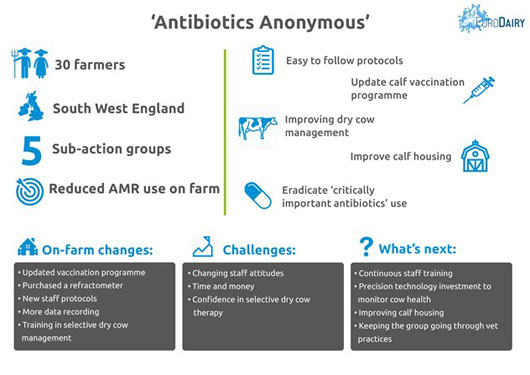



EuroDairy's 'Antibiotics Anonymous' Final Meeting
UK - For the last two years, thirty forward thinking farmers have participated in multiple action-groups across South-West England, aiming to reduce their use of on-farm antibiotics.The farmer-named group, 'Antibiotics Anonymous', represented a wide range of farming systems; from organic and conventional 60 to 600 cow herds, block to all year round calving patterns, grazing and housed herds; all with different opportunities and challenges.
Using the stable schools approach from Denmark, this super-farmer action group led by Lisa Morgans, Bristol Vet School, used knowledge and expertise from farmers to provide practical solutions to reduce antibiotic use.
Speaking at the final meeting, Ms Morgans said: "Reducing reliance of antibiotics reduction is a key focus in the dairy industry, all of the farmers involved in the action group put in 100 per cent to try and reduce their reliance on antibiotics. One farmer in particular stands out, as he successfully implemented over 90 per cent of the practical ideas on his action plan."
Four of the farms involved successfully reduced antibiotic use across all of the criteria’s of measurement, with many more farms achieving a reduction for some of the criterion. Additionally, nine farms stopped using 'highest priority critically important' antibiotics completely, increasing the total of farms not using these from 20 to 50 per cent.
'Antibiotics Anonymous' has demonstrated the advantages of farmer-to-farmer learning. Farm walks led by the host farmer encouraged farmers to compare and contrast, and consider best practices, challenges and opportunities around reducing antibiotic use.
Farmer-to-farmer learning has been a benefit for many involved in the project, but the farmers noted the power of this learning style to bring people together and build relationships, allowing for more open discussion and feedback.
"Going round other farms allowed us to cherry pick ideas from each other and when you go home you start to think how you could implement similar changes on your own farm," explained one farmer from the group.
From farm maps to score-charts and ping-pong ball voting systems, Ms Morgans used various methods to capture the group’s ideas; which helped to develop bespoke action plans for each farm. As a result, some three hundred practical steps were identified for the farmers to introduce over the course of a year.
The top three focus areas on the action plans included lameness management, cubicles, bedding and calf housing management. In one innovative example, one farmer made small changes to his calf house, following hands on ideas from other farmers, which helped to reduce incidences of respiratory diseases. After seeing a different protocol on one farm, another farmer changed his parlour milking routine, which helped to reduce the rate of mastitis.
Additionally, following a EuroDairy exchange visit to the Netherlands, two farmers implemented further changes, including dry cow management and using selective dry cow therapy to adapting cubicles to improve comfort to encourage an more lying time.
Discussing at the finale meeting one farmer stated, "Prevention is better than cure!" - a clear mantra for those involved in the group.
AHDB Dairy will shortly be releasing a podcast, which outlines the work EuroDairy is doing to help reduce antibiotic use. Farmers are advised to keep an eye out on the EuroDairy website to learn more about the super-action farmer group, how one pilot farmer is reducing the use of antibiotics on his farm and French farmers view on the topic during a recent exchange visit to the UK.

You can find out further information about EuroDairy's work by clicking here.
TheCattleSite News Desk



